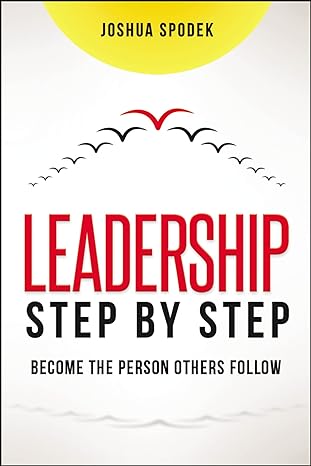I recommend reflecting on your experience with this chapters exercise. Students who take my courses have to
Question:
I recommend reflecting on your experience with this chapter’s exercise. Students who take my courses have to write reflections to get to the next exercise and often describe writing their reflections as among the most valuable part of the course. Write about anything you found relevant, but here are some questions you may want to consider:
- What is the value of seeing your son’s or other loved one’s expressions?
- Who notices if you miss them?
- What about the nuances of your boss’s communications?
- What can you do if you sense them?
- What did you observe about your senses and attention?
- What did you observe about your ability to focus?
- Where and how might you apply your experience in the rest of your life?
Data from Exercises
Every leader I’ve heard say anything about self-awareness describes it as fundamental to leadership and growth. Every system of leadership, professional development, or personal development I’ve seen has some concept of self-awareness at its foundation. Yet most people don’t know what it means—those who lack it most more than anyone.
Talking, reading, or being lectured about self-awareness doesn’t help you increase it. Experience does. We’ll start with an exercise in awareness of our senses, which later exercises will extend to awareness of other parts of ourselves. This chapter’s exercise starts you off more effectively than any other I know. It comes from one of the premier figures in mindfulness today, Jon Kabat-Zinn’s book Coming to Our Senses. Many who finished this book’s exercises consider it the cornerstone, as do I.
When I teach the course in person and assign the exercise, I ask my students if it sounds odd. Many say yes. The next week, after they’ve done it, I ask if I should assign it the next year even if it seemed weird when they heard it. They always say yes.
It will also introduce many of you to the value of Method Learning—that is, you’ll find yourself learning things doing the exercises that you never could from someone telling you.
What to Do
1. Get three raisins. You can use raisin-sized pieces of other fruit if you prefer.
2. Block off an hour when you can turn off your phone and other distractions. You won’t take that long, but the cushion keeps you from feeling rushed.
3. During that hour, put the three raisins in front of you and eat them as follows:
• Imagine you’ve never seen one before.
• Observe it with all your senses in turn. Look at it—its folds, its color, and so on. Feel it in your fingers, how it moves when you press on it. Try to detect if it has a smell. Taste it before you bite into it and then after. Feel how it dissolves in your mouth. Hear its sound if you drop it on a plate. And so on with all your senses.
• Only start the next raisin after you have swallowed all of the remnants of the first.
Step by Step Answer:

Leadership Step By Step Become The Person Others Follow
ISBN: 978-1400239146
1st Edition
Authors: Joshua Spodek





